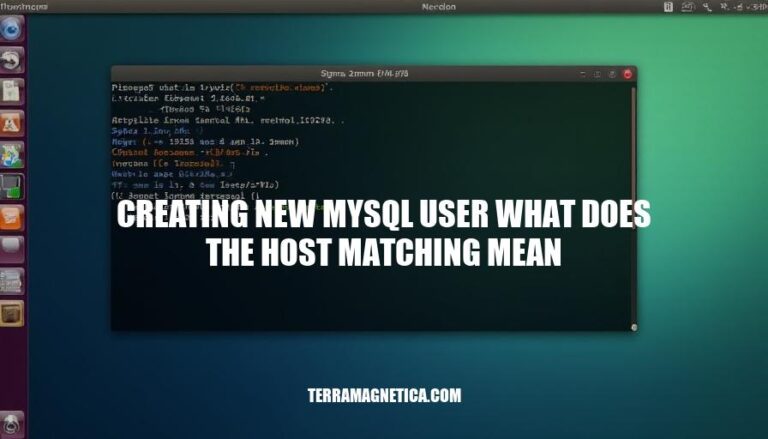


Creating a new MySQL user is essential for managing database access and privileges. This process involves specifying the username, password, and defining the host from which the user is allowed to connect. Host matching in MySQL determines the exact source a user is connecting from, allowing administrators to control access based on specific IP addresses, hostnames, or wildcards.
This mechanism is crucial for enforcing security policies and ensuring that only authorized users connect to the database from approved locations.
When you create a new MySQL user, you specify both a username and the host from which this user is allowed to connect to the MySQL server. This host matching mechanism ensures that only users connecting from specified hosts can access the database. The host can be an IP address, a domain name, or even a wildcard, such as ‘%’ to allow connections from any host.
By controlling access based on host, MySQL enhances security.
Even if the correct username and password are provided, access will be denied unless the connection originates from a permitted host. For example, creating a user like 'user'@'localhost' limits access to local connections only, while 'user'@'%' permits connections from any host. This precision helps manage database security and user permissions.
Log in to the MySQL server as root:
mysql -u root -p
Create a new MySQL user:
CREATE USER 'username'@'localhost' IDENTIFIED BY 'password';
'localhost' specifies that the user can connect only from the local machine. For remote access, replace 'localhost' with the host’s IP address or '% to allow connections from any host.
Grant privileges to the new user:
GRANT ALL PRIVILEGES ON database_name.* TO 'username'@'localhost';
Again, replace 'localhost' with the appropriate host if needed.
Flush privileges to apply changes:
FLUSH PRIVILEGES;
Test the new user:
mysql -u username -p -h localhost
Replace localhost if testing remote access. This checks if host matching and privileges are correctly set.
Each host entry determines from where the user can connect: 'localhost' is for local connections, IP addresses for specific remote connections, and '%' for any host.
In MySQL, host matching is a critical concept when defining user privileges, as it determines from which host or IP address a user can connect to the MySQL server. Here are some scenarios:
Localhost Access: You might create a user who can only connect from the local machine. For example:
CREATE USER 'localuser'@'localhost' IDENTIFIED BY 'password';
Remote Access from a Specific IP: When you want a user to access the database from a specific remote IP address:
CREATE USER 'remoteuser'@'192.168.1.100' IDENTIFIED BY 'password';
Remote Access from a Range of IPs: If you need to allow access from a range of IP addresses:
CREATE USER 'rangeuser'@'192.168.1.%' IDENTIFIED BY 'password';
Access from Any Host: To allow a user to connect from any host:
CREATE USER 'anyhostuser'@'%' IDENTIFIED BY 'password';
Domain-Based Access: For allowing connections from hosts within a specific domain:
CREATE USER 'domainuser'@'example.com' IDENTIFIED BY 'password';
Each scenario has its purpose, such as tightening security by limiting access only to trusted hosts or providing flexibility for users connecting from multiple locations.
Use Specific Hostnames: Always specify the exact hostname or IP address for the user. Avoid using wildcards like % unless necessary.
Limit Privileges: Grant the minimum necessary privileges to the user based on their role and responsibilities.
Regular Audits: Periodically review user privileges and host matching settings to ensure they are still appropriate.
Use Roles: Utilize roles to manage privileges more efficiently, especially for users with similar responsibilities.
Secure Passwords: Ensure strong, unique passwords for each user and change them regularly.
Monitor Access: Implement monitoring to track user activity and detect any unauthorized access attempts.
Backup Privileges: Regularly back up user privileges and host matching settings to recover quickly from any issues.
Update Practices: Keep up with best practices and updates from MySQL documentation to ensure security and efficiency.
Creating a new MySQL user involves specifying the username, password, and defining the host from which the user is allowed to connect.
Host matching in MySQL determines the exact source a user is connecting from, allowing administrators to control access based on specific IP addresses, hostnames, or wildcards. This mechanism is crucial for enforcing security policies and ensuring that only authorized users connect to the database from approved locations.
By controlling access based on host, MySQL enhances security by denying access even if the correct username and password are provided unless the connection originates from a permitted host.
Host matching is critical when defining user privileges, determining from which host or IP address a user can connect to the MySQL server. Scenarios include: